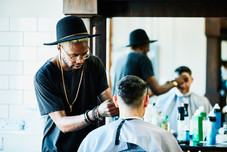The entrepreneurial mindset is booming with the next generation entering the workforce. According to a recent survey conducted by EY and JA Worldwide, more than 50% of participants born between 1997 and 2007 hope to run their own business someday — and 65% of all participants who are already in the workforce have the same ambition.
The types of businesses that attract the Gen Z audience — roughly defined as people born between the late 1990s and early 2010s — are also taking shape. Gen Z over-indexes on desiring brands that appear young, trendy, funny, bold, and innovative, according to a recent Global Web Index report. They also over-index on valuing brands that help customers improve their image, offer customized/personalized products, run customer communities, support charities, and make customers feel valued.
Many businesses operated by these up-and-coming entrepreneurs are already taking off. Here are the types of ventures that are quickly becoming the most popular.
Gaming
The Global Web Index indicated that 63% of Gen Zs are interested in gaming, 12 percentage points ahead of Millennials. From gaming studios to influencers to community organizers, this is a space Gen Z is expected to own moving forward.
Examples
- In 2015, Sam Rosenthal founded The Game Band, an award-winning video game studio responsible for viral hits such as Blaseball and Where Cards Fall. The Paris Review called Blaseball “the most entertaining and unique event on the internet,” citing the game’s push-and-pull between the creators and the audience to quickly simulate entire baseball seasons that go off the rails.
- Delane Parnell launched PlayVS in 2018, building a platform for high school and college esports leagues that includes popular titles, tracked stats, coach tools, and support specialists. Parnell saw an opportunity to create an infrastructure similar to more traditional high school and college sports, like basketball or football, and give esports the same support and resources.
Beauty
More than 38% of the Gen Z audience surveyed expressed an interest in beauty, and many small business owners have found success in the space by making their own products and putting their own brand front and center.
Examples
- Jamika Martin launched Rosen Skincare to create the next generation of acne products. As a sixth-grader, Martin couldn’t find the right mix of clean products fueled by modern research with a brand she identified with, so she started her own line. Rosen Skincare now operates with an online store and at retailers such as Target.
- Jasmine Butler’s Juicy by Jay line sells vegan and cruelty-free lip products and includes a donation of lip jelly to programs that empower women with every purchase.
Fine Art
As the art world becomes more democratized, Gen Z is catching on with businesses promoting personality-driven, accessible work with wide appeal.
Examples
- Originally launched online during the pandemic, Kyrstin Constantino now pops up at farmers and flea markets across Los Angeles promoting The Klay Shop, featuring her handmade polymer clay earrings and homeware.
- Reese Cooper launched his first menswear collection in 2018 in Paris, citing vintage Americana fused with the great outdoors as the brand’s primary inspirations. Cooper’s interdisciplinary work mixes personal experience with a focus on community, education, and the environment.
Food
There’s a wide range of strong Gen Z entrants into the food space, covering everything from casual spots with throwback appeal to bold brands breaking through with new products.
Examples
- Three childhood friends from New Jersey opened up Ggiata Deli in Los Angeles, fueled by their love of classic Italian staples and fresh local ingredients. Eater has called it one of LAs best Italian sandwich spots. And after starting as a ghost kitchen operation during the pandemic, Ggiata moved into its own space this year with plans to expand.
- Nick Guillen and Nick Ajluni founded TRUFF Sauce because they didn’t see anyone else combining the flavors they were craving. They’ve grown their brand with thoughtful collaborations and targeted Gen Z marketing.
![]()











